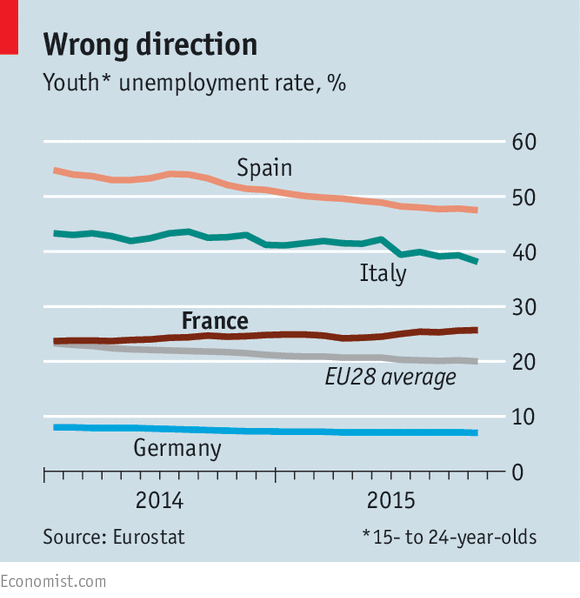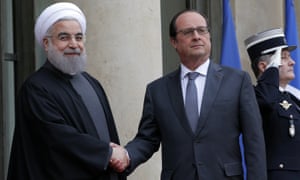France's Dilemma: Terrorism/Unemployment
 |
| January 2015 Paris demonstrations: Olivier Ortelpa |
"Psychologically, it can create a real lack of confidence. If you don’t have a permanent contract in France, it’s impossible to rent a flat, or get a loan."French President François Hollande's New Year message to the country was his resounding declaration acknowledging that a double state of emergency exists in France, and he vowed his determination to handle them both; he would continue to dedicate himself and all of France's considerable resources to fighting and defeating the terrorism that spread its hot, rancid breath of death over France, and unemployment would be tackled and similarly, but by other means, defeated.
Ange-Mireille Gnao, Franco-Ivorian
"Technically we could cut the unemployment rate in half. The difficulty is political."
Nicolas Bouzou, French economist
His critics see an inextricable link between terrorism and unemployment, and certainly it seems a case can be made for homegrown terrorism and the high unemployment rate among Muslim immigrants and their youth. Is defeating terrorism then, an anger-management solution among the disaffected? Isn't that akin to the usual excuses for 'impressionable youth' looking for a meaningful anchor in their lives, and succumbing to the solicitations of Islamist jihadist agents on their recruiting drives, embracing the zeal and promise of jihad in defiance of a system that excludes them?
Manuel Valls, the Socialist prime minister, has himself however, described France's 3,800-page labour code as "unreadable", but does that translate as an admission that it is as a consequence unworkable? Presumably and with good enough reason. He has promised that he will go about simplifying the code, seen as a hindrance to employment, ruling out altering the 35-hour work week, though. And Mr. Hollande for his part, is intent on training a half-million youth through apprenticeship programs.
Nothing is ever as simple as a heartfelt promise. But promises cannot be discounted for their importance in pre-election times. Still, Emmanuel Macron, France's economy minister, insists on the vital importance of deregulation for the purpose of persuading companies that they have an obligation to their futures and that of the country to create jobs. Which sounds really excellent if it can be done without upsetting unions and the hard left friends of the Socialists. France's labour code is close to sacred in their estimation.

Currently, France's unemployment is at 3.6-million people without work, representing 10.6 percent of the population. In contrast, Britain's unemployment rate stands at 5.1 percent, and Germany's a truly enviable 4.5 percent. This is, needless to say, without taking into account the prospect of the Syrian refugee presence altering that rate significantly. But Chancellor Merkel may finally have figured that one out, by declaring that once Syria has been stabilized Germany will expect Syrians to return to their country of origin.
In France, the joblessness rate of youth under 25 is a troubling 24.5 percent, as opposed to Germany's seven percent for youth. In the immigrant suburbs, the banlieues, that unemployment rate is likelier to be 30 to 35 percent, and therein lies the kind of provocation that breeds huge discontent that begins with the ritual of torching hundreds of vehicles in a rage of petulant disaffection, then ascends to the height of payback for unspeakable humiliations heaped upon resentful Muslims by transforming them into jihadists.
As bad as unemployment is now in France, the state of joblessness appears to be rising. So in lock-step with rising unemployment is the falling esteem in which President Hollande is held. Yet on the other hand, his declarations of a heightened battle against terrorism wins him plaudits.
Somehow, the terrorist-fighting demographic which approves of that tough talk manages to look past and beyond the love-in conducted by their president with Iranian President Rouhani with a resolute Hollande quick to count the ways France can benefit financially from cossetting the world's most obvious cultivator of terrorism and human rights abuses. And Rouhani, a master of deceit, recognizes an accomplished artist in chicanery.
 |
| François Hollande and Hassan Rouhani before a meeting at the Élysée palace in Paris. Photograph: Christophe Ena/AP |
As for unemployment itself, the unions of France; militant, entitled -- capable of launching crippling strikes despite their narrow enrolment numbers of seven percent of the workforce -- have much to say about the issue. And their political influence is to be discounted only by those who deliberately skim by reality. The threat of paralyzing strikes shutting down vital services does call for sober second thought.
Millions are affected by those strikes and they have an additional effect of chilling employment as well. France is by definition a socialist country, dedicated to all things socialist, none less obvious than work, when unions fulfill their obligation to society and the state through stiff bargaining that ensures people will work less and earn more, stifling the urge among employers to engage in increased hiring of staff.
Meanwhile, French students know how important a good education is, and they commit themselves to earning the required paperwork to prove they are fit to be employed. If those diplomas are issued from the Ecole Poltechnique or Ecole Nationale d'Administration, they're assured good jobs, government positions, they're set for life. Otherwise, aside from the socio-economic elite in an ostensibly egalitarian society, not so much.
The French Labour Code is 3,689 pages long, setting out excruciating details of the rights of workers, where laying people off is well nigh impossible, leading managers to hire fewer workers than they might be persuaded would be in the best interests of their efficient operations. And at the bottom of the ranking scale? Why of course, children of immigrants among whom are those who would so much rather take part in the glamour and excitement of jihad than hold down paid employment.
 |
A young child stops as mourners gather
in front of the Petit Cambodge and Le Carillon restaurants in Paris,
France. There have been fears that France is now wide-open to the terror
threat Photo: Getty Images
|
A Nov. 13, 2015 string of terrorist attacks across Paris
that killed 129 people has again raised concerns across French society
about jihadist violence and ISIS-inspired domestic terrorism. The
tragedy comes in the wake of several other attacks in France in 2015,
including an attack on an American-owned chemical factory near Lyon in
June 2015 and two in January 2015, when 12 people were murdered at the satirical news outlet Charlie Hebdo and then, days later, four hostages were killed at a kosher supermarket.
Like other European nations, France has a long and complicated relationship with the Muslim world and its own immigrant population, many of whom have been in the country for generations. French Muslims are highly diverse, and some are secular while others are observant. One of the policemen killed in the Charlie Hebdo attacks, Ahmed Merabet, was Muslim. Some are at the center of society — soccer player Zinedine Zidane, born in Marseille to Algerian parents, led France to a World Cup victory in 1998 — but large segments of the population remain excluded. Research from INSEE, France’s national statistical agency, indicates that in 2013, the unemployment rate for all immigrants was approximately 17.3%, nearly 80% higher than the non-immigrant rate of 9.7%, and descendents of immigrants from Africa have a significantly more difficult time finding work. The report found that the education and skill levels only explained 61% of the difference in employment rates between descendents of African immigrants and those whose parents were born in France.
- See more at: http://journalistsresource.org/studies/international/conflicts/france-muslims-terrorism-integration-research-roundup#sthash.NhMQtsFR.dpuf
Like other European nations, France has a long and complicated relationship with the Muslim world and its own immigrant population, many of whom have been in the country for generations. French Muslims are highly diverse, and some are secular while others are observant. One of the policemen killed in the Charlie Hebdo attacks, Ahmed Merabet, was Muslim. Some are at the center of society — soccer player Zinedine Zidane, born in Marseille to Algerian parents, led France to a World Cup victory in 1998 — but large segments of the population remain excluded. Research from INSEE, France’s national statistical agency, indicates that in 2013, the unemployment rate for all immigrants was approximately 17.3%, nearly 80% higher than the non-immigrant rate of 9.7%, and descendents of immigrants from Africa have a significantly more difficult time finding work. The report found that the education and skill levels only explained 61% of the difference in employment rates between descendents of African immigrants and those whose parents were born in France.
- See more at: http://journalistsresource.org/studies/international/conflicts/france-muslims-terrorism-integration-research-roundup#sthash.NhMQtsFR.dpuf
A Nov. 13, 2015 string of terrorist attacks across Paris
that killed 129 people has again raised concerns across French society
about jihadist violence and ISIS-inspired domestic terrorism. The
tragedy comes in the wake of several other attacks in France in 2015,
including an attack on an American-owned chemical factory near Lyon in
June 2015 and two in January 2015, when 12 people were murdered at the satirical news outlet Charlie Hebdo and then, days later, four hostages were killed at a kosher supermarket.
Like other European nations, France has a long and complicated relationship with the Muslim world and its own immigrant population, many of whom have been in the country for generations. French Muslims are highly diverse, and some are secular while others are observant. One of the policemen killed in the Charlie Hebdo attacks, Ahmed Merabet, was Muslim. Some are at the center of society — soccer player Zinedine Zidane, born in Marseille to Algerian parents, led France to a World Cup victory in 1998 — but large segments of the population remain excluded. Research from INSEE, France’s national statistical agency, indicates that in 2013, the unemployment rate for all immigrants was approximately 17.3%, nearly 80% higher than the non-immigrant rate of 9.7%, and descendents of immigrants from Africa have a significantly more difficult time finding work. The report found that the education and skill levels only explained 61% of the difference in employment rates between descendents of African immigrants and those whose parents were born in France.
- See more at: http://journalistsresource.org/studies/international/conflicts/france-muslims-terrorism-integration-research-roundup#sthash.NhMQtsFR.dpuf
Like other European nations, France has a long and complicated relationship with the Muslim world and its own immigrant population, many of whom have been in the country for generations. French Muslims are highly diverse, and some are secular while others are observant. One of the policemen killed in the Charlie Hebdo attacks, Ahmed Merabet, was Muslim. Some are at the center of society — soccer player Zinedine Zidane, born in Marseille to Algerian parents, led France to a World Cup victory in 1998 — but large segments of the population remain excluded. Research from INSEE, France’s national statistical agency, indicates that in 2013, the unemployment rate for all immigrants was approximately 17.3%, nearly 80% higher than the non-immigrant rate of 9.7%, and descendents of immigrants from Africa have a significantly more difficult time finding work. The report found that the education and skill levels only explained 61% of the difference in employment rates between descendents of African immigrants and those whose parents were born in France.
- See more at: http://journalistsresource.org/studies/international/conflicts/france-muslims-terrorism-integration-research-roundup#sthash.NhMQtsFR.dpuf
Labels: Employment, France, Immigration, Islamism, Terrorism

<< Home